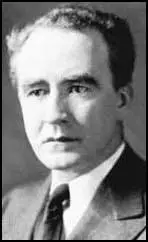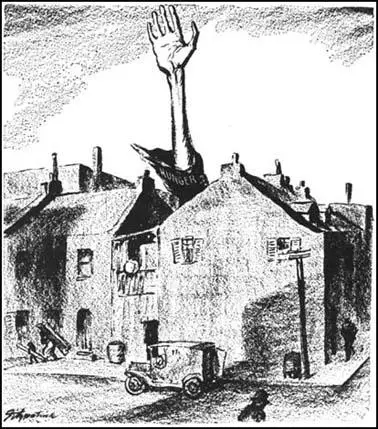Frank Murphy

Frank Murphy was born in Harbor Beach, Michigan, on 13th April, 1890. As a child worker in a local factory he developed a strong hatred of exploitation and a sympathy for the underprivileged.
After a long struggle Murphy was able to fund his studies at the University of Michigan. He graduated in 1914 and worked in Detroit as a law clerk during the day and a teacher at night school.
Murphy joined the United States Army during the First World War and saw action in France. After the war he remained in Europe where he studied law in Trinity College, Dublin and in Lincoln's Inn, London.
On his return to the United States he became chief assistant to the U.S. attorney of Eastern Michigan District where it is claimed he never lost a case. After a spell of private practice he was appointed a judge in Detroit(1923-30). A member of the Democratic Party, Murphy was elected mayor of Detroit and during his period of office (1930-33) he received national recognition for his efforts to help the unemployed.
In 1931 Murphy wrote in The Unemployed magazine: "The time has come when widespread unemployment has ceased to be the concern of one group. It is neither the affair solely of the manufacturer nor of the unemployed. There was a time when the contractual relationship between the employer and the employee was supposed to be none of the public's business. That time has passed. Today the stability of employment is the direct business of every taxpayer and every citizen, because they are responsible for the support and maintenance of those who are of jobs. It is the public who must foot the bills and it is the public who most interest itself in the question which has become, not a class, but a social issue."
Murphy developed a reputation for honest and efficient government. In 1999, Melvin Holli, the author of The American Mayor, and a group of experts on local government, voted Murphy as the seventh best mayor in United States history. Holli wrote: "Murphy helped to establish the U.S. Conference of Mayors, was a New Dealer before there was a New Deal, lobbied for federal aid to cities, and tried to feed the hungry during the Great Depression - and balance the city's books."

Daniel Fitzpatrick, The Unemployed (1931)
A strong supporter of Franklin D. Roosevelt and the New Deal, Murphy served as governor-general of the Philippines (1933-35) and United States High Commissioner (1935-36). Murphy was elected as governor of Michigan in 1937. Controversially, Murphy refused to employ troops to help break strikes by automobile workers. This upset industrialists in Michigan and they successfully used their power to make sure he was not re-elected as governor.
Franklin D. Roosevelt appointed Murphy as his Attorney General in 1939. The following year the president nominated him to become a member of the Supreme Court. Over the next nine years Murphy established himself as a strong defender of civil rights. R, the author of T (
Frank Murphy died in Detroit on 19th July, 1949.
Primary Sources
(1) Frank Murphy, while mayor of Detroit, had an article published in the radical journal, The Unemployed (Spring, 1931)
The time has come when widespread unemployment has ceased to be the concern of one group. It is neither the affair solely of the manufacturer nor of the unemployed. There was a time when the contractual relationship between the employer and the employee was supposed to be none of the public's business. That time has passed. Today the stability of employment is the direct business of every taxpayer and every citizen, because they are responsible for the support and maintenance of those who are of jobs. It is the public who must foot the bills and it is the public who most interest itself in the question which has become, not a class, but a social issue.
The first consideration of a widespread unemployment situation is a practical, satisfactory relief program. The mapping out of such a program is not an easy matter. For example, in Detroit there are 1,500,000 souls but only 300,000 taxpayers. The taxpayers have been providing heat, rent, light, food and clothes for 45,000 destitute families, the breadwinners of which, in the main, are employed in factories that for tax reasons border on the city limits - just outside, and do not contribute to the support of their former employees.
12,000 homeless men are cared for daily in two lodging houses, one on the west side, donated by the Fisher Brothers, one on the east side, donated by the Studebaker Corporation. 1,800,000 meals have been given and 350,000 nights's lodgings supplied. Two meals are served, each meal consisting of a well balanced, sufficient diet. Ninety thousand lunches have been given to the school children of the unemployed. At present 8,000 children daily are being fed in school. One hundred and twenty-five thousand person have been outfitted with clothes by the clothing bureau; 700 homeless women are being cared for in private homes or small institutions like the YWCA or League of Catholic Women. But the most satisfactory part of the work is the establishment of an Employment Bureau which has given out 21,000 jobs.
(2) Melvin Holli, The American Mayor (1999)
Detroit's Frank Murphy (1930-33), secured seventh place, drawing one first-place vote and five second-place votes, and the affirmative votes of twenty of our respondents. Democratic Murphy helped to establish the U.S. Conference of Mayors, was a New Dealer before there was a New Deal, lobbied for federal aid to cities, and tried to feed the hungry during the Great Depression - and balance the city's books. Mayor Murphy has become better known to urbanists since the publication of Sidney Fine's definitive biography, Frank Murphy: The Detroit Years (1975). Murphy deserves wider recognition, especially because his post-mayoral career of upward movement is remarkable and striking for a mayor. After service in city hall, Murphy rose rapidly to become governor-general of the Philippines, then governor of Michigan, and next a U.S. Attorney General. He ended his public career as a U.S. Supreme Court justice. Few big-city mayors have experienced such dramatic and visible upward political mobility.
